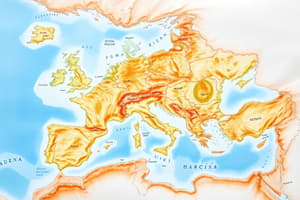Podcast
Questions and Answers
What is Hecate's main complaint about the three Witches?
What is Hecate's main complaint about the three Witches?
- They are too focused on their charms and spells.
- They are neglecting their duties to the dead.
- They have meddled in matters that do not concern them.
- They have not included her in their dealings with Macbeth. (correct)
What does Hecate instruct the Witches to do in preparation for their meeting?
What does Hecate instruct the Witches to do in preparation for their meeting?
- Meet her at the pit of Acheron. (correct)
- Gather ingredients for their spells.
- Conjure spirits to help Macbeth.
- Send Macbeth a warning.
What does Hecate plan to use to create illusions?
What does Hecate plan to use to create illusions?
- A potion derived from the moon.
- A charm made from herbs.
- A powerful spell book.
- A vaporous drop. (correct)
According to Hecate, what is 'mortals' chiefest enemy'?
According to Hecate, what is 'mortals' chiefest enemy'?
What attitude does Hecate suggest Macbeth possesses?
What attitude does Hecate suggest Macbeth possesses?
What does Hecate mean when she refers to Macbeth as a 'wayward son'?
What does Hecate mean when she refers to Macbeth as a 'wayward son'?
What is the significance of Hecate mentioning 'the pit of Acheron'?
What is the significance of Hecate mentioning 'the pit of Acheron'?
What does Hecate plan to achieve with the 'vaporous drop' she mentions?
What does Hecate plan to achieve with the 'vaporous drop' she mentions?
How does Hecate characterize the nature of security in relation to humans?
How does Hecate characterize the nature of security in relation to humans?
What does Hecate imply about her role compared to the other witches?
What does Hecate imply about her role compared to the other witches?
What does Hecate imply about her relationship to the other Witches when she refers to them as 'beldams'?
What does Hecate imply about her relationship to the other Witches when she refers to them as 'beldams'?
What does the phrase 'artificial sprites' suggest about Hecate's intentions?
What does the phrase 'artificial sprites' suggest about Hecate's intentions?
What significance does Hecate's statement about security being 'mortals' chiefest enemy' have in relation to Macbeth's character?
What significance does Hecate's statement about security being 'mortals' chiefest enemy' have in relation to Macbeth's character?
What can be inferred about Hecate's view towards Macbeth's actions and motives?
What can be inferred about Hecate's view towards Macbeth's actions and motives?
What does Hecate’s intent to 'catch' the 'vaporous drop' imply about her approach to magic?
What does Hecate’s intent to 'catch' the 'vaporous drop' imply about her approach to magic?
How does Hecate view Macbeth's character in terms of loyalty and ambition?
How does Hecate view Macbeth's character in terms of loyalty and ambition?
What does Hecate mean by saying security is 'mortals' chiefest enemy'?
What does Hecate mean by saying security is 'mortals' chiefest enemy'?
What is the significance of Hecate's instruction to meet at 'the pit of Acheron'?
What is the significance of Hecate's instruction to meet at 'the pit of Acheron'?
How does the language Hecate uses to address the other Witches illustrate her authority?
How does the language Hecate uses to address the other Witches illustrate her authority?
What does Hecate's plan to create 'artificial sprites' suggest about her intentions toward Macbeth?
What does Hecate's plan to create 'artificial sprites' suggest about her intentions toward Macbeth?
What underlying message might Hecate's admonition to the Witches reflect about ambition?
What underlying message might Hecate's admonition to the Witches reflect about ambition?
How does Hecate's description of Macbeth as 'spiteful and wrathful' contribute to our understanding of his character?
How does Hecate's description of Macbeth as 'spiteful and wrathful' contribute to our understanding of his character?
In what way does Hecate's statement about the 'vaporous drop' symbolize her control over destiny?
In what way does Hecate's statement about the 'vaporous drop' symbolize her control over destiny?
Discuss the significance of security being labeled as 'mortals' chiefest enemy' in Hecate's speech.
Discuss the significance of security being labeled as 'mortals' chiefest enemy' in Hecate's speech.
What does Hecate's plan to summon 'artificial sprites' reveal about her approach to manipulation?
What does Hecate's plan to summon 'artificial sprites' reveal about her approach to manipulation?
Flashcards are hidden until you start studying
Study Notes
Hecate's Anger
- Hecate, the powerful witch, is furious with the three witches for conspiring with Macbeth without her knowledge.
- She feels betrayed and belittled, questioning why she, the "mistress of your charms" and "close contriver of all harms", was not included in their dealings.
- The witches are accused of being reckless and overstepping their boundaries by involving themselves with Macbeth's ambitious schemes.
Hecate's Revenge Plot
- Hecate vows to take action and regain control of the situation.
- She orders the witches to meet her at "the pit of Acheron" (Greek underworld) at dawn.
- She warns them to prepare their vessels and spells, implying a plan to manipulate Macbeth's fate.
Hecate's Manipulation
- Hecate reveals her intention to create powerful sprites that will lure Macbeth towards his downfall.
- She plans to use a "vaporous drop profound" from the moon to create these illusions.
- These spirits will exploit Macbeth's sense of security and arrogance, leading him to believe he is invincible.
A Warning to Macbeth
- The witches are reminded that "security is mortals' chiefest enemy", implying that overconfidence will be Macbeth's undoing.
- As Hecate departs, a song begins, signaling the imminent and fateful events that await Macbeth.
Hecate's Anger
- Hecate, the goddess of witchcraft, is angry with the three witches for dealing with Macbeth without her involvement.
- She reprimands them for their audacity and emphasizes her role as the "mistress of your charms" and the "close contriver of all harms."
- She expresses disappointment that their actions have only benefited Macbeth, a "wayward son" who acts out of self-interest.
Hecate's Plan
- Hecate demands the witches to make amends by meeting her at the pit of Acheron, a river in the underworld, at dawn.
- She instructs them to prepare their vessels, spells, and charms, as Macbeth will come to learn his destiny.
- Hecate reveals her own plan to manipulate Macbeth through magic.
- She will collect a potent "vaporous drop" from the moon and use it to create artificial spirits who will lead Macbeth to his doom.
- She warns that Macbeth's confidence in his own power will be his downfall, as "security is mortals' chiefest enemy."
The Call of the Spirits
- Hecate hears a song from her spirits and departs to join them, leaving the witches to carry out her instructions.
Hecate's Arrival and Anger
- Hecate, the goddess of witchcraft, arrives, furious at the three witches for summoning Macbeth without her.
- She criticizes their audacity in dealing with Macbeth in matters of death, implying they lack respect for her authority and power.
- Hecate is furious that she, the "mistress of your charms," was not invited to participate.
Macbeth's Characterization
- Hecate describes Macbeth as a "wayward son," suggesting he is driven by ambition and fueled by hate, acting out of self-interest. He is not a true believer in their powers and their magic.
Hecate's Plan to Manipulate Macbeth
- Hecate plans to manipulate Macbeth's ambition further by orchestrating a final, fateful encounter on the "corner of the moon" where he will be exposed to supernatural forces.
- She reveals her plan: a "vaporous drop profound" will be distilled to create powerful illusions that will ultimately lead Macbeth to his demise.
- She insists that the witches prepare themselves as she will meet them at Acheron to orchestrate the next stage of their plan.
- Hecate concludes by warning that security, or a false sense of safety, is the enemy of mortals – highlighting Macbeth’s vulnerability.
Hecate's Departure
- Hecate exits as a song begins, indicating her departure into the night.
Dramatic Significance
- Hecate's appearance sets the stage for the final confrontation between Macbeth and the witches.
- She is introduced to us at a moment when her power and control are being challenged, and intends to re-establish her position as the ultimate manipulator of events.
- The scene suggests that Macbeth's downfall is not only his own ambition, but also a result of the witches’ supernatural games.
Hecate's Arrival and Anger
- Hecate, the goddess of witchcraft, arrives on the heath, angry at the three witches for their actions.
- She expresses her displeasure that they conducted spells and interacted with Macbeth without her involvement.
- She claims to be the "mistress of your charms" and the "close contriver of all harms", emphasizing her authority over witchcraft.
Hecate's Criticism of Macbeth
- Hecate criticizes Macbeth as a "wayward son," implying that he is not a true servant of the witches.
- Hecate notes that Macbeth acts out of selfish ambition and not for the sake of their craft.
Hecate's Plan
- Hecate orders the witches to meet her at the pit of Acheron (a river in the underworld) at dawn.
- She reveals her intention to guide Macbeth towards his doom through a plan involving a "vaporous drop," potent spells, and illusions.
- This "vaporous drop" will be used to conjure spirits that will further manipulate Macbeth's fate leading to his downfall.
- She expresses that Macbeth will feel secure, underestimating the inevitability of his destiny, which will ultimately lead to his downfall.
Hecate's Departure
- Hecate departs, noting that she has "great business" to attend to before noon .
- She leaves the witches to prepare for her rendezvous with Macbeth, emphasizing that she will "catch" a "vaporous drop" from the moon.
- This drop will be crucial to her plan to manipulate Macbeth's fate, as it will be distilled into powerful magic, and ultimately used to conjure spirits that will lead Macbeth toward his downfall.
Hecate's Arrival and Anger
- Hecate, the goddess of witchcraft, enters and scolds the three Witches.
- She is furious that they made a deal with Macbeth without including her, the "mistress of your charms".
- She feels they have not shown proper respect for her role and power.
- Hecate emphasizes the importance of her "art," implying that she is a powerful and respected figure in the realm of magic.
Macbeth's Actions and Hecate's Plans
- Hecate condemns Macbeth's actions as "wayward," "spiteful," and "wrathful," suggesting she is aware of his ambition and cruelty.
- She argues that Macbeth loves only for his own self-interest, not for the witches or their craft.
- Hecate commands the witches to make amends by preparing for a meeting at the pit of Acheron, a place associated with death and the underworld.
- She reveals that Macbeth will come to learn his destiny, indicating a tragic outcome for him.
Hecate's Final Actions
- Hecate declares that she has "great business" to attend to before noon.
- She mentions gathering a "vaporous drop profound" from the moon, which she will use in her magic.
- This drop, when distilled, will create "artificial sprites" that will lead Macbeth to his downfall.
- She emphasizes the power of her magic and its role in Macbeth's ultimate destruction.
- Hecate warns that "security" is "mortals' chiefest enemy," suggesting that Macbeth's confidence and arrogance will be his undoing.
- She leaves, departing for the "air" and a "dismal and fatal end."
The Witches' Fate
- They are commanded by Hecate to prepare for the meeting at Acheron.
- They will play a role in Macbeth's fate, as they are ordered to provide their vessels, spells, charms, and everything they need for the magical plot.
Studying That Suits You
Use AI to generate personalized quizzes and flashcards to suit your learning preferences.




